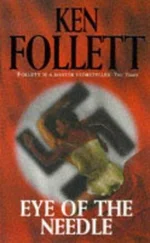Ken Follett - Winter of the World (Century Trilogy 2)
Здесь есть возможность читать онлайн «Ken Follett - Winter of the World (Century Trilogy 2)» весь текст электронной книги совершенно бесплатно (целиком полную версию без сокращений). В некоторых случаях можно слушать аудио, скачать через торрент в формате fb2 и присутствует краткое содержание. Жанр: Старинная литература, на английском языке. Описание произведения, (предисловие) а так же отзывы посетителей доступны на портале библиотеки ЛибКат.
- Название:Winter of the World (Century Trilogy 2)
- Автор:
- Жанр:
- Год:неизвестен
- ISBN:нет данных
- Рейтинг книги:5 / 5. Голосов: 2
-
Избранное:Добавить в избранное
- Отзывы:
-
Ваша оценка:
- 100
- 1
- 2
- 3
- 4
- 5
Winter of the World (Century Trilogy 2): краткое содержание, описание и аннотация
Предлагаем к чтению аннотацию, описание, краткое содержание или предисловие (зависит от того, что написал сам автор книги «Winter of the World (Century Trilogy 2)»). Если вы не нашли необходимую информацию о книге — напишите в комментариях, мы постараемся отыскать её.
Winter of the World (Century Trilogy 2) — читать онлайн бесплатно полную книгу (весь текст) целиком
Ниже представлен текст книги, разбитый по страницам. Система сохранения места последней прочитанной страницы, позволяет с удобством читать онлайн бесплатно книгу «Winter of the World (Century Trilogy 2)», без необходимости каждый раз заново искать на чём Вы остановились. Поставьте закладку, и сможете в любой момент перейти на страницу, на которой закончили чтение.
Интервал:
Закладка:
Two black Mercedes cars roared up just as the police were erecting their cordon. Lloyd looked on with interest. Out of the second car jumped a man in a light-coloured trench coat and a floppy black hat. He had a narrow moustache under his nose. Lloyd realized that he was looking at the new Chancellor, Adolf Hitler.
Behind Hitler followed a taller man in the black uniform of the Schutzstaffel , the SS, his personal bodyguard. Limping after them came the Jew-hating propaganda chief Joseph Goebbels. Lloyd recognized them from newspaper photographs. He was so fascinated to see them close up that he forgot to be horrified.
Hitler ran up the steps two at a time, heading directly towards Lloyd. On impulse, Lloyd pushed open the big door and held it wide for the Chancellor. With a nod to him, Hitler walked in, and his entourage followed.
Lloyd joined them. No one spoke to him. Hitler’s people seemed to assume he was one of the Reichstag staff, and vice versa.
There was a foul smell of wet ashes. Hitler and his party stepped over charred beams and hosepipes, treading in mucky puddles. In the entrance hall stood Hermann Göring, a camel-hair coat covering his huge belly, his hat turned up in front, Potsdam-fashion. This was the man who was packing the police force with Nazis, Lloyd thought, recalling the conversation in the restaurant.
As soon as Göring saw Hitler he shouted: ‘This is the beginning of the Communist uprising! Now they’ll strike out! There’s not a minute to waste!’
Lloyd felt weirdly as if he were in the audience at the theatre, and these powerful men were being played by actors.
Hitler was even more histrionic than Göring. ‘There will be no mercy now!’ he shrieked. He sounded as if he was addressing a stadium. ‘Anyone who stands in our way will be butchered.’ He trembled as he worked himself up into a fury. ‘Every Communist functionary will be shot where he is found. The Communist deputies to the Reichstag must be hanged this very night.’ He looked as if he would burst.
But there was something artificial about it all. Hitler’s hatred seemed real, but the outburst was also a performance, put on for the benefit of those around him, his own people and others. He was an actor, feeling a genuine emotion but amplifying it for the audience. And it was working, Lloyd saw: everyone within earshot was staring, mesmerized.
Göring said: ‘My Führer, this is my chief of political police, Rudolf Diels.’ He indicated a slim, dark-haired man at his side. ‘He has already arrested one of the perpetrators.’
Diels was not hysterical. Calmly he said: ‘Marinus van der Lubbe, a Dutch construction worker.’
‘And a Communist!’ Göring said triumphantly.
Diels said: ‘Expelled from the Dutch Communist Party for starting fires.’
‘I knew it!’ said Hitler.
Lloyd saw that Hitler was determined to blame the Communists, regardless of the facts.
Diels said deferentially: ‘From my first interrogation of the man, I have to say that it is clear that he is a lunatic, working alone.’
‘Nonsense!’ Hitler cried. ‘This was planned long in advance. But they miscalculated! They don’t understand that the people are on our side.’
Göring turned to Diels. ‘The police are on an emergency footing from this moment,’ he said. ‘We have lists of Communists – Reichstag deputies, local government elected representatives, Communist Party organizers and activists. Arrest them all – tonight! Firearms should be used ruthlessly. Interrogate them without mercy.’
‘Yes, Minister,’ said Diels.
Lloyd realized that Walter had been right to worry. This was the pretext the Nazis had been looking for. They were not going to listen to anyone who said that the fire had been started by a lone madman. They wanted a Communist plot so that they could announce a crackdown.
Göring looked down with distaste at the muck on his shoes. ‘My official residence is only a minute away, but it is fortunately unaffected by the fire, my Führer,’ he said. ‘Perhaps we should adjourn there?’
‘Yes. We have much to discuss.’
Lloyd held the door and they all went out. As they drove away, he stepped over the police cordon and rejoined his mother and the von Ulrichs.
Ethel said: ‘Lloyd! Where have you been? I was worried sick!’
‘I went inside,’ he said.
‘What? How?’
‘No one stopped me. It’s all chaos and confusion.’
His mother threw her hands in the air. ‘He has no sense of danger,’ she said.
‘I met Adolf Hitler.’
Walter said: ‘Did he say anything?’
‘He’s blaming the Communists for the fire. There’s going to be a purge.’
‘God help us,’ said Walter.
(iii)
Thomas Macke was still smarting from the sarcasm of Robert von Ulrich. ‘Your brother wants to move up in the world, as you have,’ von Ulrich had said.
Macke wished he had thought to reply: ‘And why should we not? We are as good as you, you arrogant popinjay.’ Now he yearned for revenge. But for a few days he was too busy to do anything about it.
The headquarters of the Prussian secret police were in a large, elegant building of classical architecture at No. 8 Prinz Albrecht Strasse in the government quarter. Macke felt proud every time he walked through the door.
It was a hectic time. Four thousand Communists had been arrested within twenty-four hours of the Reichstag fire, and more were being rounded up every hour. Germany was being cleansed of a plague, and to Macke the Berlin air already tasted purer.
But the police files were not up to date. People had moved house, elections had been lost and won, old men had died and young men had taken their places. Macke was in charge of a group updating the records, finding new names and addresses.
He was good at this. He liked registers, directories, street maps, news clippings, any kind of list. His talents had not been valued at the Kreuzberg police station, where criminal intelligence was simply beating up suspects until they named names. He was hoping to be better appreciated here.
Not that he had any problem with beating up suspects. In his office at the back of the building he could hear the screams of men and women being tortured in the basement, but it did not bother him. They were traitors, subversives and revolutionaries. They had ruined Germany with their strikes, and they would do worse if they got the chance. He had no sympathy for them. He only wished Robert von Ulrich was among them, groaning in agony and begging for mercy.
It was eight o’clock in the evening on Thursday 2 March before he got a chance to check on Robert.
He sent his team home, and took a sheaf of updated lists upstairs to his boss, Criminal Inspector Kringelein. Then he returned to the files.
He was in no hurry to go home. He lived alone. His wife, an undisciplined woman, had gone off with a waiter from his brother’s restaurant, saying she wanted to be free. There were no children.
He began to comb the files.
He had already established that Robert von Ulrich had joined the Nazi Party in 1923 and had left two years later. That in itself did not mean much. Macke needed more.
The filing system was not as logical as he would have liked. All in all, he was disappointed in the Prussian police. The rumour was that Göring was equally unimpressed, and planned to detach the political and intelligence departments from the regular force and form them into a new, more efficient secret police force. Macke thought that was a good idea.
Meanwhile, he failed to find Robert von Ulrich in any of the regular files. Perhaps that was not merely a sign of inefficiency. The man might be blameless. As an Austrian count, he was unlikely to be a Communist or a Jew. It seemed the worst that could be said of him was that his cousin Walter was a Social Democrat. That was not a crime – not yet.
Читать дальшеИнтервал:
Закладка:
Похожие книги на «Winter of the World (Century Trilogy 2)»
Представляем Вашему вниманию похожие книги на «Winter of the World (Century Trilogy 2)» списком для выбора. Мы отобрали схожую по названию и смыслу литературу в надежде предоставить читателям больше вариантов отыскать новые, интересные, ещё непрочитанные произведения.
Обсуждение, отзывы о книге «Winter of the World (Century Trilogy 2)» и просто собственные мнения читателей. Оставьте ваши комментарии, напишите, что Вы думаете о произведении, его смысле или главных героях. Укажите что конкретно понравилось, а что нет, и почему Вы так считаете.












